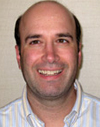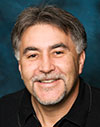|
|
|
PANELS Monday 10 January 2011
Location: Sunset 1
16:00 - 17:00
P1: Challenges in Securing Modern Applications and Data
Abstract
Security is rarely a well-isolated application, yet very few modern systems survive without robust and trustworthy protection of executables and data. In this panel, a team of experts will review will and focus on challenging problems in multimedia content delivery. Unlike traditional security systems, receivers of multimedia content are *not* trusted parties: consumers have no natural incentive to use multimedia content in a manner that is compliant with copyright owner usage rules. This panel will discuss the technical, business and social means that are available to allow a thriving multimedia market, satisfying ll players in the value chain. Topics that will be discussed include hardware and software security, DRM, forensics and watermarking, protocols and usage models, ease of use, and compliance and robustness.
Panel Members
Darko Kirovski, Microsoft, Research

Darko Kirovski received a Ph.D. in computer science from the University of California, Los Angeles, in 2001. Since 2000, he has been a researcher at Microsoft Research. His research interests include: Web services, reliable computing, system security, multimedia processing, and embedded system design. He has received the 1999 Microsoft Graduate Research Fellowship, the 2000 ACM/IEEE Design Automation Conference Graduate Scholarship, the 2001 ACM Outstanding Ph.D. Dissertation Award in Electronic Design Automation, and best paper awards at the ACM Multimedia 2002 and the IEEE MMSP 2006. He has authored more than 100 journal and conference papers and filed more than 80 patents.
Ton Kalker, Huawei, VP of Technology

Ton Kalker is VP of Technology at FutureWei Technologies. He made significant contributions to the field of media security, in particular digital watermarking, robust media identification and interoperability of Digital Rights Managements systems. His history in this field of research started in 1996, submitting and participating in the standardization of video watermarking for DVD copy protection. His solution was accepted as the core technology for the proposed DVD copy protection standard and earned him the title of Fellow of the IEEE. His subsequent research focused on robust media identification, where he laid the foundation of the Content Identification business unit of Philips Electronics, successful in commercializing watermarking and other identification technologies. In his Philips period he has co-authored 30 patents and 39 patent applications. His interests are in the field of signal and audio-visual processing, media security, biometrics, information theory and cryptography. Joining Hewlett-Packard in 2004, he focused his research on the problem of noninteroperability of DRM systems. He became one of the three lead architects of the Coral consortium, publishing a standard framework for DRM interoperability in the summer of 2007. In December 2010 he joined FutureWei Technologies as VP of Technology. He participates actively in the academic community, through students, publications, keynotes, lectures, membership in program committees and serving as conference chair. He is a co-founder of the IEEE
Transactions on Information Forensics. He is the former chair of the associated Technical Committee of Information Forensics and Security. He served for 6 years as visiting faculty at the University of Eindhoven. He is currently a visiting professor at the Harbin Institute of technology.
Alex Deacon, Symantec, Distinguished Engineer

Alex recently joined Symantec Research Labs (SRL) as a Distinguished Engineer after Symantec's acquisition of VeriSign's Authentication Business Units. At VeriSign Alex was Distinguished Engineer and Director of Industry Leadership and Technology Strategy in VeriSign Labs where he was responsible for VeriSign's participation strategy in external standards development organizations and the long-term feature evolution of VeriSign products, services and toolkits. Alex joined VeriSign in 1995 as a founding member of the technical staff and has been a key contributor in the design, development and architecture of VeriSign public key infrastructure(PKI) products and services. Throughout his tenure Panel Session ICCN-11 (Las Vegas) atVeriSign, Alex has represented VeriSign through active participation in organizations that span several industries including content protection, RFID, mobile and broadband.
Jan Steenkamp, Irdeto, VP Americas

Jan Steenkamp is a founding member of Irdeto and an expert in media. Jan studied electrical engineering at Witwatersrand Technikon and started his career as a video engineer at the South Africa Broadcasting Corporation. Having held key management positions within the Naspers Group since 1985, Jan most recently served as CEO of Entriq. Before joining Entriq, Jan was CEO of MIHL's technology division and Chairman of OpenTV Corp. Prior to that, he was CEO of OpenTV. Jan has been a prominent voice in the TV Everywhere movement, authoring several papers on the challenges and opportunities of its implementation and speaking on panels at top industry conferences. Before moving to the United States to run OpenTV, Jan was one of the founders of Irdeto in the Netherlands where he was the Commercial Director of Irdeto Consultants. During this time he held various management and new business initiative positions at both Irdeto and the MIH Group from 1985 to 1997. Before moving to the Netherlands to start Irdeto, Jan was part of the pioneer team at the Nasper Group who started the first Pay Television service in South Africa.
Tuesday 11 January 2011
P2: Next-Generation Video / Television Services and Standards
Location: Celebrity Ballroom 3
14:00 - 15:00
Panel Title
Next-Generation Video / Television Services and Standards Abstract: New technologies are emerging that are destined to change the world of television and other video applications as they now exist. The development of appropriate international standards for deployment of new services will be an important element of these developments. Some examples include the High Efficiency Video Coding standard that is now under development by ISO/IEC MPEG and ITU-T VCEG in their new Joint Collaborative Team on Video Coding (JCT-VC), the emergence of stereoscopic 3D video for a wide variety of applications and form factors, robust scalable video coding for multi-party videoconferencing
over unreliable packet networks, IPTV and dynamic adaptive streaming on HTTP for Internet video delivery, and 1080p50/60 and ultra high-resolution television This panel will discuss emerging the technology for next-generation video systems, new developments in standardization, and what kinds of further developments are needed toward creating the longer-term future of video systems and services.
Panel members
Gary J. Sullivan, Ph.D.
Gary J. Sullivan has been a longstanding chairman or co-chairman of the ITU-T Video Coding Experts Group (VCEG), the video subgroup of the ISO/IEC Moving Picture Experts Group (MPEG), the ITU-T/ISO/IEC Joint Video Team (JVT), and more recently the ITU-T/ISO/IEC Joint Collaborative Team for Video Coding (JCT-VC). He is best known for leading the development of the ITU-T H.264 | ISO/IEC 14496-10 MPEG-4 Advanced Video Coding (AVC) standard from the inception of the project through several editions and extension efforts, including the Fidelity Range Extensions (FRExt), professional profiles, Scalable Video Coding (SVC) and 3D / Stereo / Multiview Video Coding (MVC). He is a Video/Image Technology Architect in the Windows division of Microsoft Corporation. At Microsoft he has been the originator and lead designer of the DirectX Video Acceleration (DXVA) video decoding feature of the Microsoft Windows operating system. He and the team efforts that he has led have been recognized by an ATAS PrimeTime Emmy Engineering Award, a pair of NATAS Technology & Engineering Emmy Awards, the IEEE Consumer Electronics Engineering Excellence Award, the INCITS Technical Excellence Award, the IMTC Leadership Award, the University of Louisville J. B. Speed Professional Award in Engineering, the Microsoft Technical Achievement in Standardization Award, and the Microsoft
Business Achievement in Standardization Award. He is a Fellow of the IEEE and SPIE. Dr. Sullivan holds B.S. and M.Eng. degrees in Electrical Engineering from the University of Louisville, and Ph.D. and Engineers degrees in Electrical Engineering from the University of California at Los Angeles. Prior to joining Microsoft in 1999, he was the Manager of Communications Core Research at PictureTel Corporation, a Howard Hughes Fellow and member of the technical staff in the Advanced Systems Division of the Hughes Aircraft Corporation, and an avionics software engineer with Texas Instruments.
Ajay Luthra, Ph.D.
Ajay Luthra is Senior Director/Fellow of Technical Staff in Advanced Technology Group for Motorola Mobile Devices and Home, located in San Diego, CA. In this role, he is responsible for advanced development work in the areas of Digital Video Compression & Processing, Internet Video, 3D TV, Cable Head-End system design, Advanced Set Top Box architectures and Home Networking. Before joining Motorola, he served as a Director, Communication and Video Systems Lab (1990-1995) for Tektronix and a manager for the DSP Group (1985-1990). He has been an active member of MPEG committee for more than seventeen years where he has chaired several technical sub-groups and pioneered the
MPEG-2 extensions for studio applications. He was associate rapporteur/vice-chair of Joint Video Team (JVT), consisting of ISO/MPEG and ITU-T/VCEG experts. The JVT developed the Emmy awards winning video coding standard known as MPEG-4 AVC / H.264. He has also been the US Head of Delegates (HoD) to MPEG and chair of INCITS/L3.1 committee since 2004. He was an Associate Editor of IEEE Transactions on Circuits and Systems for Video Technology (2000-2002) and also a Guest Editor for its Special Issues on H.264/AVC Video Coding Standard, July 2003 and Streaming Video, March 2001. He is a Senior Member of the IEEE. Dr. Luthra holds a B.E. (Hons) from BITS, Pilani, India, an M.Tech. in Communications Engineering from IIT Delhi, and a Ph.D. from Moore School of Electrical Engineering,
University of Pennsylvania.
|
|
